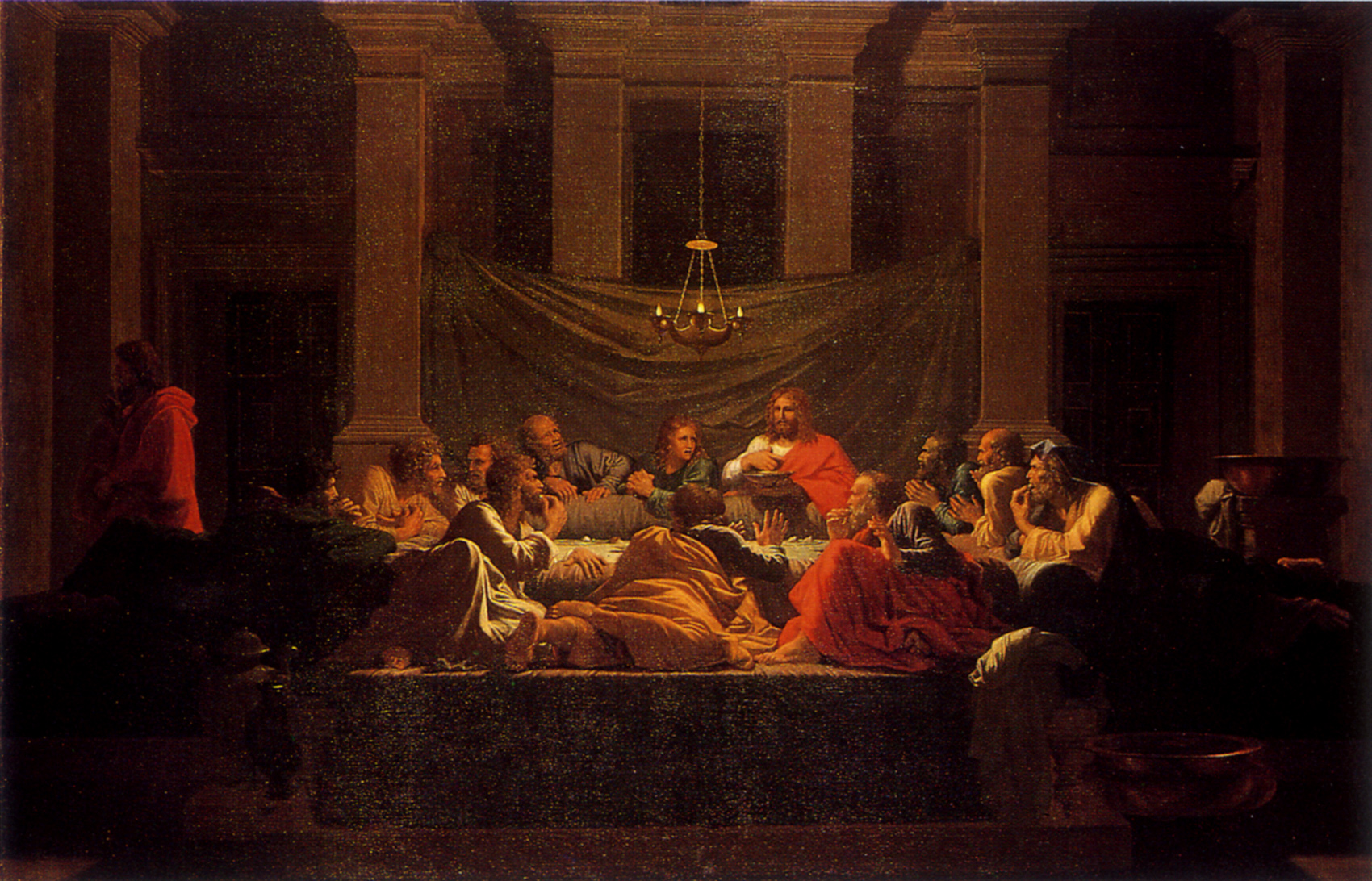[Greek] ἀναμιμνῄσκω (anamimnēskō), [Latin] reminiscere, [Latin] rememorare: to remind, to call to mind, to remember, to cause to remember, to recollect, to reminisce; Mk.11:21, Mk.14:72, 1Cor.4:17, 2Cor.7:15, 2Tim.1:6, Heb.10:32

The Institution of the Eucharist: painting by Nicola Poussin (1647). The disciples actually reclined on small floor cushions at the Last Supper. Jesus calls His disciples to do this in remembrance of Him again and again.
Background information:
Greek Hellenism: This term means to remind oneself, to recall to memory, to make mention of, and to remember. Sophocles’ Oedipus Tyrannus 1133 states “But I will bring clear recollection to his ignorance.” Euripides’ Alcestis 1045 states “Do not remind me of my troubles.” Homer’s Odyssey 3.211 states “Friend, since thou calledst this to my mind and didst speak of it, they say that many wooers for the hand of my mother devise evils in thy halls in thy despite.” Plato’s Phaedo 72e states “If it is true, Socrates, as you are fond of saying, that our learning is another else than recollection, then this would be an additional argument that we must necessarily have learned in some previous time what we now remember.”
Old Testament: This term means to remember, to recall, to call to mind, to record, to mention, to make a memorial, to retain in memory, and to be mindful of. There are many Old Testament scriptural references. The ancient notion of memory comes from the idea of pricking, piercing, or penetrating memories. The sayings of the wise are like goads. The king had on his staff a recorder or historian. This minister’s task was to record events as they occurred, especially if they relate to the King. The Jewish people repeatedly offer memorial offerings and recall (re-memorialize) the Passover event.
And I will remember My covenant, which is between Me and you and every living creature of all fresh (Gen.9:15). Remember the Sabbath day, to keep it holy (Exo.2:24). You have come to bring my iniquity to remembrance and to put my son to death (1Kgs.17:18). Jehospaphat the son Ahilud was the recorder (1Kgs.4:3). Put Me in remembrance, let us argue our case together (Isa.43:26). Recall it to mind, you transgressors (Isa.46:8). And it will never again be the confidence of the house of Israel, bringing to mind the iniquity of their having turned to Egypt (Eze.29:16).
New Testament: This term means to remember, to cause to remember, and to remind. Peter recalls that the tree, which Jesus had cursed, has withered. Upon denying Jesus three times, Peter remembered Jesus’s words about the cock crowing twice. Peter then broke down and wept. Paul sends Timothy to remind the Corinthians of his (Paul) ways in Christ. Titus remembers the obedience of the Corinthians as they received him. Paul reminds Timothy to be stirred into flame with the gift that he has received by the imposition of Paul’s hands. Paul reminds the Hebrew Christians that they had endured great suffering in days past.
Scripture:
“And immediately a cock crowed a second time. Then Peter remembered the word that Jesus had said to him, ‘Before the cock crows twice you will deny me three times.’ He broke down and wept.”
Peter remembers and realizes that he has betrayed Jesus. It is somewhat ironic that Jesus would choose Peter, weak and unsure of himself, as the leader of the disciples.
“For this reason I am sending you Timothy, who is my beloved and faithful son in the Lord; he will remind you of my ways in Christ Jesus, just as I teach them everywhere in every church.”
Paul’s ways are in contrast to the human ways of the Corinthians.
“For this reason, I remind you to stir in the flame the gift of God that you have through the imposition of my hands.” 2Tim.1:6
Timothy receives grace from the imposition of Paul’s hands. Timothy received an apostolic office from Paul.
Anamnesis: This is the related noun for this term. Anamnesis means a calling to mind, reminder and remembrance. The Greek prefix ana- means again and back. The Greek verb mimneskomai means to recall and to remember. Interestingly, this term occurs in Lk 22:19 (“do this in memory of me”), and 1Cor11:25 (“in remembrance of me”). Essentially, Jesus was telling His disciples to offer repeatedly (again and again…etc.) His Body and Blood. Likewise, the related antonym amnesis means forgetfulness (not remembering). The Greek prefix a- essentially means “not”.
Conclusion:
Amnesia, anamnesis, reminisce, re-memorialize, record
In the Greek Hellenistic era, this term finds itself in various contexts and situations. However, this term take on greater importance in Catholicism (Christianity) in regards to the meaning of the Last Supper.
In the Old Testament, it is interesting to note that there are very many scriptural references. The more important meanings include to make a memorial of, to re-memorialize, to recall, to make a memorial offering, and to remember. These meanings point ahead to the recalling and re-offering (again and again…) of what is offered at the Last Supper.
In the Catholic Mass, the Eucharist is the re-presentation of the one and only sacrifice at Calvary. The offered bread and wine is changed by the priest (through the help of the Holy Spirit) into the Body and Blood of Christ.
Anamnesis is essentially the remembering of things from a previous event or existence. This can also mean the patient medical information obtained by a doctor or nurse.
Scriptural exegesis refers to the “drawing out” of the original meaning of scripture. In contrast, scriptural eisegesis means “putting in” your interpretation (opinion) of what scripture means. (This essentially means: “This is what I think the scripture means…). The potential and countless interpretations of scripture (which interpretation is correct?) infers the need to draw upon the original meaning of scripture, Church teachings, and Sacred Tradition.
A post like this has helped to remind me why I am very interested in scriptural exegesis.
